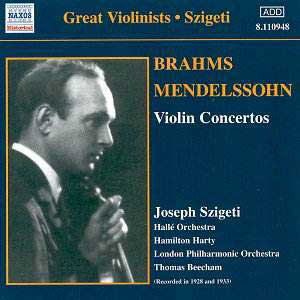The Brahms concerto opens with a surprise, a pronounced
portamento between the third and fourth notes of the orchestral
introduction which is only the first in a series of similar slides from
the orchestral strings. Many of these seem pasted on, neither very effective
from the expressive point of view nor even always particularly logical
in the string players’ technical context. Szigeti indulges in slides
too, but they seem far more spontaneous coming from the soloist than
they do from the massed strings. Apart from this the only other aspect
of these performances likely to seem strange to listeners with little
experience of historical recordings is a certain freedom of tempo and
pulse. Here again, the purpose of many of the small variations in tempo,
some of which last only for a bar or two, is often difficult to fathom.
I’m thinking of the first movement in particular, here; the slow movement
and finale contain much less of this. Indeed, apart from the actual
sound of the playing, these two movements could easily come from a more
recent interpretation. The crucial oboe solo in the slow movement gives
little pleasure: the sound of the instrument is crude and harsh compared
to modern playing, and even the player’s way with phrasing seems laboured
and unrefined. Szigeti’s reading of the solo part is masterly, though,
at once humble – he remains at all times at the service of the composer
– and full of character. Few soloists manage this particular balancing
act so well. His reading of the work is convincing too. Only in the
finale did I think a slightly slower tempo might have brought out a
little more Hungarian flavour. The crucial passage immediately following
the first movement cadenza is marvellously done. The gentle return of
the opening theme is slowly, patiently transformed into the passionate,
even tempestuous music with which the movement closes. This is extremely
beautiful and moving.
If anything, though, I enjoyed Szigeti’s reading of
the Mendelssohn concerto even more, and certainly a good deal more than
Kreisler’s 1935 performance with Landon Ronald which I recently reviewed.
He plays with greater technical assurance than Kreisler, for one thing,
and his way with the music has a simpler, more spontaneous feel to it.
The Mendelssohn is essentially a simple work of singing lines and this
is exactly how Szigeti presents it, though he is not averse to a bit
of expressive accretion when it suits him. His accompaniment – if one
can call it that – of the first movement second subject, for example,
a low held open G, is delivered with a large-scale expressive swell
which will certainly not suit everybody but which I find most effective
and well judged.
Beecham brings meaning and substance to the passage
which links the first two movements in a most uncanny way. Szigeti takes
more time than Kreisler over the slow movement, though one may argue
that his tempo, though closer to what we are used to today, is a little
slow for an andante, and portamento is once again very
much, perhaps too much, in evidence here. Soloist and orchestra deliver
a marvellously propulsive finale, deliciously light where required,
and full of wit and good humour. Szigeti’s double stops in the final
bars are thrilling.
I have no doubt that the sound, judged on its own terms,
is excellent for its period, thanks in part to the remarkable restoration
work of Mark Obert-Thorn. But compared to a modern recording the sound
is execrable and it seems to me that the performances must have something
very special about them to persuade the collector to listen repeatedly
to them simply for pleasure. Readers will already know if they are likely
to fall into this category, but my view is that if you can take the
sliding Hallé strings and the sound of their principal oboe,
these are both performances which are interesting in their own right
as well as for historical reasons. More recent recommendations, of which
there are a large number, seem irrelevant in this context.
William Hedley
see
also review
by Jonathan Woolf


